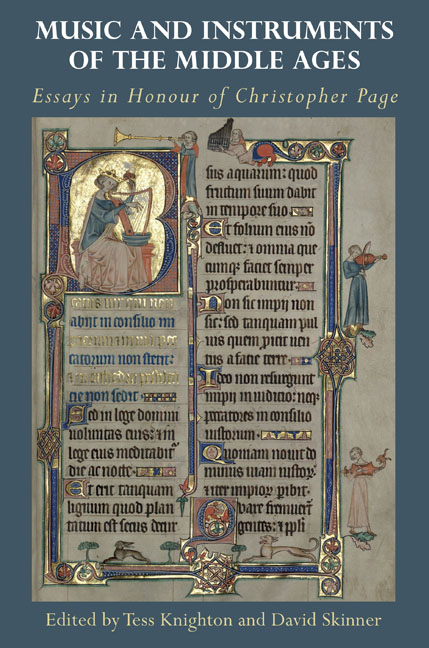Book contents
- Frontmatter
- Contents
- List of Illustrations
- List of Music Examples
- List of Tables
- List of Contributors
- List of Music Manuscript Sigla
- Acknowledgements
- Introduction
- SONGSTERS AND THEIR REPERTORIES
- CLOSE READINGS
- CREATING POLYPHONY
- MUSIC AS CULTURAL PRACTICE
- Works Cited
- Works by Christopher Page
- Index
- Tabula Gratulatoria
- Studies in Medieval and Renaissance Music
16 - ‘Übersingen’ and ‘Quintieren’: Non-Mensural Polyphony in Secular Repertories: Oswald von Wolkenstein and the Monk of Salzburg
Published online by Cambridge University Press: 24 November 2020
- Frontmatter
- Contents
- List of Illustrations
- List of Music Examples
- List of Tables
- List of Contributors
- List of Music Manuscript Sigla
- Acknowledgements
- Introduction
- SONGSTERS AND THEIR REPERTORIES
- CLOSE READINGS
- CREATING POLYPHONY
- MUSIC AS CULTURAL PRACTICE
- Works Cited
- Works by Christopher Page
- Index
- Tabula Gratulatoria
- Studies in Medieval and Renaissance Music
Summary
ENHANCED MONOPHONY IN THE WORKS OF OSWALD VON WOLKENSTEIN AND THE MONK OF SALZBURG
The polyphonic production of Oswald von Wolkenstein (1376–1445) can roughly be categorised in two groups: the first consists of contrafacta; the second has proved difficult to place. Past scholarship has referred to this group of pieces by the same diverse terminology that Reinhard Strohm quotes at the beginning of his essay (see Chapter 15), the key terms being ‘archaic’, ‘monastic’ (‘klösterlich’), and ‘organum-like’ (‘organal’). One additional term, coined specifically for this group of Oswald's polyphonic songs, was introduced in 1977 by Ivana Pelnar and was designed to suggest an origin from local, possibly ‘oral’ practices; that term is ‘bodenständig’, which translates as ‘native’, ‘local’ or ‘down-to-earth’, and besides referring to an autochthonic repertory includes implications of the ‘simple’, the ‘rural’ and the ‘rustic’. This term also hints at a ‘peripheral’ repertory, but at the same time dodges the question of provenance to some extent since the assumed influences would have been unwritten by nature and thus untraceable in manuscripts other than Oswald's own codices. Within his codices the specimens would thus count as a ‘freak occurrence’ – a reasoning that carries the seeds of a circular argument. Furthermore, unlike the first group of polyphonic songs, the contrafacta, these songs were assumed to be Oswald's own attempts at polyphonic composition, partly because their notation and counterpoint appear to be by a non-expert and partly because none of them (with one exception) have concordances outside his manuscripts. The question of Oswald's musical training had been the subject of previous scholarship but could not ultimately be solved. However, the fact that a substantial part of his polyphonic output consists of contrafacta while this remaining part appears to be of a humbler stylistic level, paired with a lack of concordances, could point to Oswald's authorship and level of musical training. This assumption is supported by the observation that the bulk of this particular repertory was added to Oswald's first song collection (WolkA; A-Wn 2777, ?Vienna, c. 1425) as a secondary layer only after a substantial repertory of contrafacta had been entered, probably in the wake of the Council of Constance. Therefore, Oswald's experiences at the Council appear to have triggered a bout of poetic and musical activity, resulting in new monophonic songs and contrafacta followed by a surge of his own polyphonic works.
- Type
- Chapter
- Information
- Music and Instruments of the Middle AgesEssays in Honour of Christopher Page, pp. 385 - 404Publisher: Boydell & BrewerPrint publication year: 2020

